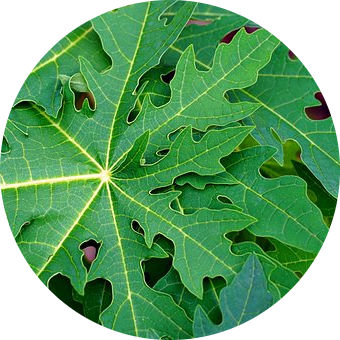- PLANT MEDICINE
- >
- Tinctures
- >
- PAPAYA LEAF TINCTURE
PAPAYA LEAF TINCTURE
Family: Caricaceae
Genus: Carica
Species: Carica papaya
Synonyms: Papaw, Pawpaw
Common Names: Papaya, Pawpaw, Tree Melon
Parts Used: Fruit, Leaves, Seeds
Main Actions: Digestive aid, Anti-inflammatory, Antioxidant
Other Actions: Immunomodulatory, Antimicrobial, Wound healing
Description: Papaya is a tropical fruit-bearing tree with large, lobed leaves and elongated, green or yellow fruits. The fruit is sweet, orange to red when ripe, and contains black seeds surrounded by a gelatinous pulp.
Tribal and Herbal Medicine Uses: Used traditionally to treat digestive disorders, wounds, and infections. Leaves are applied topically for skin conditions. Also used as an oral supplement to relieve cancer treatment side effects, treat arthritis and intestinal worms, and reduce inflammation. Papaya Leaf Extract is also used to increase low blood platelet count in Dengue fever and Chikungunya.
Plant Chemicals: Papaya contains the enzymes papain and chemopapain, as well as vitamins A, C, E, K, and B Complex (especially B17). It also contains fatty acids, bactericidal aglycone of glucotropaeolin benzyl isothiocyanate, sinigrin, the enzyme myrosin, and carpasemine, and 106 volatile components.
Biological Activities and Clinical Research: Papain exhibits digestive properties and wound healing effects. Papaya extracts show antioxidant and antimicrobial activities.
Current Practical Uses: Consumed fresh as a fruit, used in salads, juices, and smoothies. Papain is used in meat tenderizers, cosmetics, and pharmaceuticals.
Main Preparation Method: Fresh fruit consumption, herbal teas, topical applications of leaves.
Main Actions (in order): Digestive aid, Anti-inflammatory, Antioxidant
Main Uses: Digestive disorders, Inflammation, Wound healing
Properties/Actions Documented by Research: Digestive aid, Anti-inflammatory, Antioxidant, Antimicrobial
Other Properties/Actions Documented by Traditional Use: Immunomodulatory, Wound healing
Cautions: Avoid excessive consumption of seeds as they contain potentially toxic compounds. Allergic reactions to papain have been reported.
Traditional Preparation: Leaves are crushed and applied topically or brewed into a tea.
Contraindications: Avoid use in pregnancy due to potential uterine stimulation.
Drug Interactions: Potential interactions with anticoagulant medications due to the antiplatelet effects of papaya seeds.
Recommended dosage: 2-3ml taken 2x-3x daily in a small glass of water or juice on an empty stomach for better absorption.



